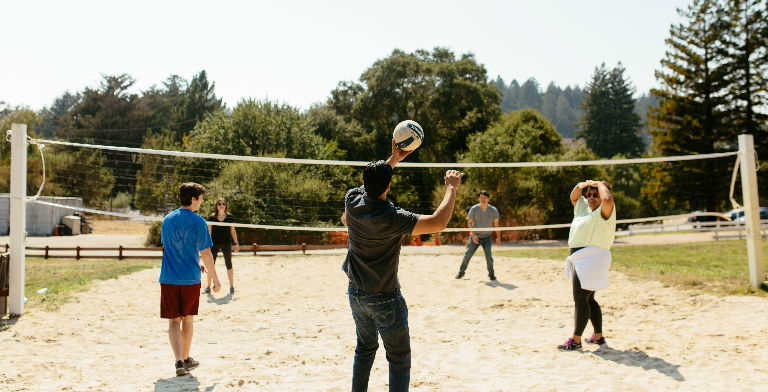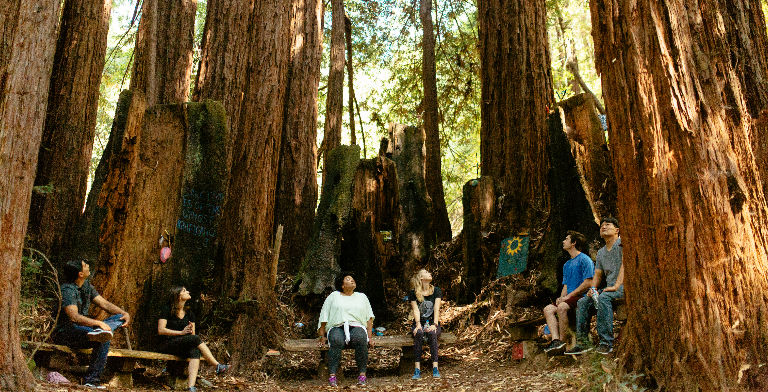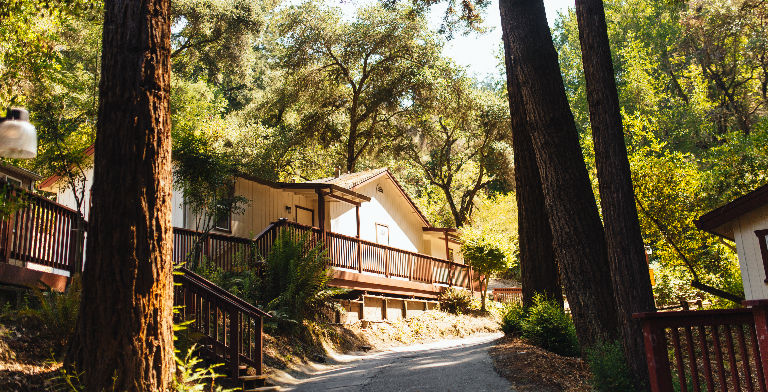The Camp Recovery Center helps adults struggling with synthetic marijuana addiction find long-term recovery. Located near Scotts Valley & San Jose, CA, The Camp provides premier synthetic marijuana abuse rehabilitation.
Synthetic Marijuana Abuse Rehab
Synthetic Marijuana Abuse Rehab Near Santa Cruz & San Jose
While developing an addiction to any type of substance can cause chaos to rapidly ensue in an individual’s life, synthetic marijuana addiction can lead to the development of not only chaos, but much devastation as well. As a relatively new substance of abuse, synthetic marijuana, also known as K2 and spice, has been making news nationwide due to the dangerous effects that it has been known to have on users. The manmade chemical composition of this substance varies drastically from batch to batch, yet all of the compositions leave users at risk for experiencing monumentally detrimental physical and mental health effects. At The Camp Recovery Center, we recognize how difficult overcoming the compulsion to use synthetic marijuana can be and have therefore created residential rehab that is aimed at helping individuals learn the skills necessary for defeating their addiction to this dangerous substance and stepping forward into a transformed life with a renewed sense of confidence in their ability to be happy, healthy, and successful.
Helping a Loved One
Helping a Loved One or Family Member Enter Synthetic Marijuana Abuse Rehab
Learning that a family member or loved one has developed an addiction to synthetic marijuana can be extremely frightening. There are still many unknowns regarding this substance and that can leave you experiencing feelings of fear and extreme concern at what the future holds for your loved one if he or she does not overcome his or her compulsion to use this dangerous drug. While you cannot force your loved one to put an end to his or her synthetic marijuana use, there are some things that you can do in order to encourage him or her to seek treatment at a rehab center. Consider the following:
- Learn as much as you can about the effects of synthetic marijuana abuse. Having this knowledge will assist you in better expressing your concerns to your loved one.
- Engage in an open dialogue with your loved one, expressing your fears and concerns in a non-judgmental and empathic manner.
- Research rehab centers and treatment programs that are equipped to work with individuals who are battling the compulsion to abuse synthetic marijuana. Share your findings with your loved one.
- Anticipate resistance on the part of your loved one. Coming to terms with the idea of getting treatment can be intimidating. Do not get angry with your loved one if he or she does not immediately jump at the idea of going to a rehab center.
- Offer to accompany your loved one to any visits that are scheduled to treatment centers or to any appointments that may be scheduled for evaluations.
- Once your loved one has begun to take part in rehab, find out how you can be an active part of his or her therapeutic process.
- Remain an ongoing source of encouragement and support for your loved one.
Why Consider Us?
Why Those Near Santa Cruz & San Jose Should Consider Synthetic Marijuana Abuse Treatment at The Camp Recovery Center
Due to the fact that the production, distribution, and use of synthetic marijuana is still relatively new, there continues to be research compiled on the long-term effects that this substance can have on users. Presently, however, there are a great of devastating consequences that have been known to occur after using synthetic marijuana. Irreversible cognitive impairment, heart attacks, strokes, and the onset of psychosis have all been documented as afflicting individuals who use synthetic marijuana. More devastatingly, there have been cases where individuals have suffered an untimely death after one single use of this toxic substance. Additionally, the longer that individuals engage in the abuse of synthetic marijuana, the more likely they are to suffer from a deterioration of relationships, academic failure, or a decline in their occupational standing. Fortunately, by engaging in rehab at a treatment center, these detriments can be successfully avoided.
Types of Treatment
Types of Synthetic Marijuana Abuse Treatment Offered at The Camp Recovery Center
Since opening our doors in 1984, The Camp Recovery Center has helped thousands of individuals break free from the grips of their addictions to synthetic marijuana. Remaining steadfast in our dedication to provide the highest quality chemical dependency rehab to those who are entrusted into our care, we embrace the values of integrity, responsibility, respect, accountability, and excellence in the treatment we provide for synthetic marijuana addition and abuse.
The Camp is staffed by an experienced and expert group of drug rehabilitation professionals, nurses, addiction counselors, and family therapists. Surrounded by the serenity of the majestic redwoods of the Santa Cruz Mountains, The Camp is proud to provide rehabilitation treatment in a tranquil environment that offers walking trails, basketball courts, tennis courts, volleyball courts, and a large sun-lit swimming pool. These beautiful surroundings, coupled with our nationally accredited and highly structured program, provides an eclectic, yet evidenced-based approach that offers new beginnings for adults who are struggling with an addiction to synthetic marijuana.
The various types of therapeutic interventions that individuals may take part in while in rehab at our recovery center include:
Detoxification: When residents arrive at The Camp with drugs or alcohol in their bodies, they may benefit from going through the detoxification process prior to fully engaging in programming. When deemed appropriate for a resident’s treatment plan, an offsite doctor, typically in the Santa Cruz / San Jose area, will develop and approve an appropriate detox protocol that will be implemented in order to best meet each resident’s specific needs.
Medication management: When residents are battling the symptoms of a co-occurring mental health condition in addition to an addiction to synthetic marijuana, they may be referred to meet with a psychiatrist to determine if psychotropic medications would be a beneficial addition to their rehab or treatment plan in order to alleviate their distressing symptoms. When this is the case, residents will continue to meet with the psychiatrist once each week in order to monitor the effects of any medications that are prescribed and to make any adjustments that are needed. Our nursing staff also assists in monitoring residents’ medications.
Individual therapy: Residents meet with their case managers twice weekly for individual therapy sessions. These sessions are designed to be a time for residents to process through their experiences in rehab, while also addressing any concerns that may arise.
Group therapy: A major component to the treatment provided at The Camp lies in the use of group therapy. Residents take part in a number of different groups 7 days per week, while also engaging in process groups 5 days per week. The specific groups that residents can expect to partake in may include:
- Focus Groups
- CBT Groups
- Women’s Group
- Men’s Group
- Experiential Group
- Activity Group
- Music / Poetry Groups
- Detox Groups
Throughout their participation in these various groups, residents will benefit from taking part in discussions on topics that may include, but are not limited to, the following:
- 12-Step Recovery
- SMART Recovery
- Relapse prevention
- Self-helping thinking
Family therapy: Residents receiving treatment for synthetic marijuana addiction can attend family therapy sessions led by marriage and family therapists. Residents and their family members will take part in family therapy sessions twice monthly. These sessions can benefit the family unit as a whole as lines of communication are reopened and negative feelings and emotions related to synthetic marijuana addiction are confronted, addressed, and healed.
Experiential therapy: In order to provide treatment that is holistic in nature, The Camp offers various types of experiential therapies that typically take place on a weekly basis and participation in various types of games. Additionally, there is time set aside for residents to spend in the gym 6 days per week. Examples of the additional experiential therapies that residents may engage in throughout their time in treatment for synthetic marijuana abuse can include:
- Yoga
- Meditation
- Acupuncture
Community meetings: Another major component to the therapeutic process at The Camp lies in our resident-run community meetings. These community meetings occur every morning, 7 days per week, where residents go over the day’s agenda, do readings, and talk about various issues pertaining to them as a group. We have found that these community meetings are immensely beneficial to residents as they not only provide them with a sense of independence in running their own meetings, but also help residents learn to support each other and develop sober relationships that can last once they have left rehab and returned to their communities.
At The Camp Recovery Center, we are dedicated to helping you get back on the road to wellness, freed from the hold that your addiction to synthetic marijuana had on you. Through the use of highly individualized rehab that is complemented by the utilization of a social model of treatment, the care provided by the compassionate staff at The Camp will help residents spring forward toward the next appropriate step in their level of care.
Knowing that treatment does not end with the completion of residential care, The Camp is pleased to offer intensive outpatient programming (IOP) for adults who are in need of a structured continuing care option once leaving The Camp. Intensive outpatient programming is conveniently located to both Santa Cruz and San Jose, CA. Our case managers work with all residents to ensure that the discharge process from the residential level of rehabilitation is a streamlined one and that continuing care services are appropriately lined up so that individuals can enjoy a safe and comfortable transition into life after their time at our treatment center.
















